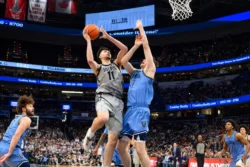I have a bone to pick with the NCAA concerning the punishments it handed down to the Ohio State Buckeyes and Penn State Nittany Lions after scandals at each school, and the respective effects on both football teams.
In late 2010, it was discovered that Ohio State was involved in a scandal in which players on the team sold memorabilia, like championship rings, jerseys, and awards to the owner of a tattoo parlor in return for both money and tattoos, violating NCAA rules. It subsequently came out that coach Jim Tressel knew about these violations, and neither reported them nor did anything about them. The players involved were rightly suspended for five games, and Tressel eventually resigned on May 30, 2011. But in December of the same year, the NCAA decided to hand down additional punishment, by putting Ohio State on probation, taking away a few scholarships and banning the team from postseason play for one year.
Penn State suffered one of the biggest sanctions in NCAA history in the aftermath of the Jerry Sandusky child sex abuse scandal, for which the NCAA punished Penn State by making it vacate all its wins from 1998 to 2011, taking away 40 scholarships over a four-year period, putting the team on probation for five years, and banning it from postseason play for four.
Now, the severity of the scandals—especially Penn State’s—is not lost on me whatsoever. I agree with most of the punishment that was handed down to each school by the NCAA.
What I do disagree with is the stipulation which keeps the schools out of postseason play. This type of ban hurts both the players and the new coaches who had absolutely nothing to do with the scandal. Considering that both OSU and PSU essentially cleaned house, effectively getting rid of anyone involved in the scandal, I find it unfair that the NCAA is implementing punishments on those who were not involved as opposed to those who were. This essentially lets the perpetrators get off somewhat scot-free while the innocent are punished.
Some of the players have been at these schools for four years, have done everything right, and both want and deserve to have a shot at a national championship. This is the situation Ohio State finds itself in, after finishing the season as only one of two undefeated teams in college football. In a world without a postseason ban, these players would most likely have the opportunity to play for a national title. But because of the poor decisions of others who are no longer with the program, they are not allowed to do so.
Penn State did not have a good enough year to contend for a national title, but the team still finished 8-4, an impressive feat considering the year which the team and university had. The players who had nothing to do with the scandal (one which exclusively involved coaches and university management with no player violations whatsoever) had the right to revive their football team from the ashes and play in a bowl game.
People will argue that the only way to keep scandals like this from happening is to lay down the law with these teams. They say that vacating wins does not necessarily have a major effect, because the memory of the wins will always be there. To them, I say that vacating wins may not be a great answer, but that does not mean a postseason ban is. The NCAA should take away more scholarships before it imposes such a ban. This does not have the direct effect on players that a ban does, because even though it impairs a team’s ability to get more talent and equally contend with other teams for a title or bowl, it still leaves the possibility for the team to at least make a bowl.
The NCAA should also do more to keep the perpetrators from ever getting back into college football or being honored in the future, as Jim Tressel and his 2002 national champion team were this past Saturday. These actions would go far enough in sending a message to both the teams and the guilty parties.
The NCAA needs to concentrate its efforts towards punishing those who committed the crimes or infractions if it plans to keep throwing down these hefty punishments in effort to make itself relevant. The more unreasonably harsh these punishments get, the less credibility the NCAA will have and the better and more victimized violating schools will look.





